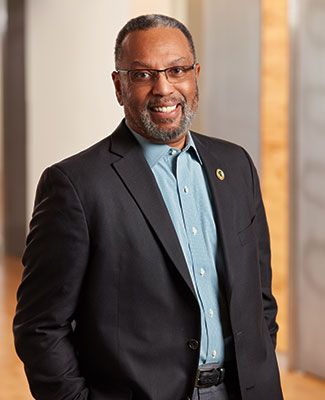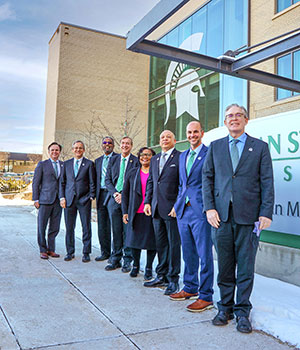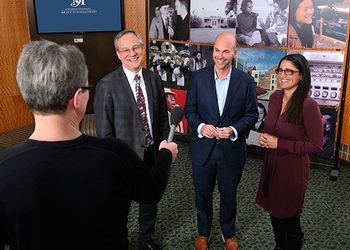Working Together
The Charles Stewart Mott Foundation has granted $25M to expand MSU’s public health program in Flint.

Working Together
The Charles Stewart Mott Foundation has granted $25M to expand MSU’s public health program in Flint.
March 25, 2022Imagine a place where an entire community is mobilized to address the health challenges facing the people who live there.
Going well beyond merely diagnosing problems, the community itself determines needs and drives decisions. Top-tier researchers and physicians provide the needed data and help shape interventions focused on good health for both individuals and the community as a whole. Partners in the community help fuel the efforts with resources and a shared commitment to improving lives.
Flint, Michigan, is such a place.
It’s the result of a strong relationship among community advocates, Michigan State University and the Charles Stewart Mott Foundation.
MSU has been in Flint for more than 100 years. The College of Human Medicine was one of the first community-based medical schools in the country and started work in Flint 51 years ago. Flint has been the home of its public health division for the past decade. The collaboration with the Charles Stewart Mott Foundation is at the very heart of that history and mission.
Now, thanks to a $25 million grant from the foundation, MSU’s Flint-based public health program is set to grow.
“Expanding MSU’s public health program in Flint is a great thing for the community, and it also will yield important lessons for our state and nation as we struggle with both emergent and chronic health challenges,” says Ridgway White, president and CEO of the Mott Foundation. “MSU’s work in Flint is a wonderful example of what can happen when physicians, researchers, residents and community advocates work together to improve health.”
The grant from the foundation will add 18 tenure-track faculty members, a significant increase from the seven current tenure system faculty. The total number of faculty will increase to 70 overall. The grant also will provide support to increase academic research and community collaborations. Focus areas for research by the faculty will include mental health, addiction and impacts of the COVID-19 pandemic, among other public health topics identified in close collaboration with the community.
“MSU has a mission to improve the lives of people through community-based research,” says President Samuel L. Stanley Jr., M.D. “Our successful collaboration with the people of Flint has allowed our scientists to create a new model for positive public health outcomes, and we are grateful for the continued support of the Charles Stewart Mott Foundation, which will allow us to build on successes.”
LONG RUNNING RELATIONSHIPS

Successful collaborations with the foundation and the community of Flint have been forged over many years.
Beginning in 2007, the college held a series of meetings with the Mott Foundation, local hospitals and other community organizations to design an expansion of the college’s work in Flint. Based on those conversations, Mott, Hurley Medical Center, (Ascension) Genesys Hospital and McLaren Flint all provided funding to expand capacity to support 100 College of Human Medicine students in Flint and create the college’s Division of Public Health, which is dedicated to community-based, participatory research in Flint.
Collaboration with the Mott Foundation was critical. Between 2011 and 2013, Mott granted $12 million to MSU to expand and relocate the Master of Public Health program from East Lansing to Flint, as well as a $7.7 million grant to the Foundation for the Uptown Reinvestment Corporation (FURC) to support renovation of the former Flint Journal building to house the program and the college’s Flint campus for medical students.
College leaders participated in more than 100 community meetings and collected nearly 4,000 surveys to engage the Flint community in the direction of the division. An Advisory Committee recommended three areas of focus and direction for public health research in Flint that address health disparities: healthy behaviors, behavioral health and chronic disease.
Building on that original groundwork, the division hired Charles Stewart Mott Endowed Professors of Public Health, Global Impact Initiative positions and distinguished principal investigators and educators for Flint. These faculty have been awarded more than $87 million in research and program funding since 2015. The online Master of Public Health degree program also moved to Flint and, this year, will congratulate its 700th graduate.
“The successful partnerships forged between our students and faculty with the residents of Flint have created new knowledge, new programming and new opportunities,” says Aron Sousa, M.D., interim dean of the MSU College of Human Medicine and one of the longtime leaders driving the public health initiative. “By helping the people of the community reach their goals, the college and its faculty are successful.”
FORTUITOUS TIMING
Today, Flint is the epicenter of public health policy development.
Shortly after the ribbon was cut on the new location for MSU’s public health program in Flint and research began in 2014, the need for public health research became even more important.
Flint is still healing from the water crisis stemming from a switch in the city’s water supply to the Flint River without proper treatment of the water to avoid lead contamination from pipes. It was in 2015 that MSU’s Dr. Mona Hanna-Attisha discovered the link between children’s elevated blood lead levels in Flint and the change in the city’s water source.
Hanna-Attisha has since headed up work with the Centers for Disease Control and Prevention’s Flint Lead Exposure Registry and successfully advocated for inclusion of the National Fruit and Vegetable Pediatric Prescription program in the 2018 Farm Bill.
MSU’s experts also have worked with community partners to develop programs to mitigate chronic diseases, identify environmental health risks and examine the social factors that influence community health. This work includes Dr. Jennifer Johnson’s community-participatory mental health and substance use interventions for perinatal women and individuals involved in the criminal justice system. Dr. Todd Lucas and his team are identifying the causes of racial health disparities through preventive health behaviors such as colorectal cancer screening and understanding the barriers to COVID-19 antibody testing and vaccinations in Flint.
The predominantly Black city has also hosted MSU’s Dr. Debra Furr-Holden, who provided national leadership throughout the COVID-19 pandemic toward curbing racial disparities in cases and deaths.
“This partnership between the community, Michigan State University and the Charles Stewart Mott Foundation gives real credibility and credence to the work, leading to strengthened public health efforts in Flint,” says E. Yvonne Lewis, Flint community member and founder and CEO of the National Center for African American Health Consciousness. “This grant represents a beacon of hope that will help elevate community-led solutions to the issues we face.”
Flint Mayor Sheldon Neeley adds that programs like the one MSU operates in Flint help lift the quality of life for everyone in the state.
“We talk about health care disparities, especially in communities of color or low- to moderate-income areas,” he said. “We need programs like this, partnerships like this, to make sure that we can deliver a better quality of life.”
BUILDING ON SUCCESS
Mott’s support of public health in Flint already has had a positive economic impact on the city. According to an MSU study for the period 2015-20, Mott’s initial $19.7 million in grants had a return of $93 million in economic output in Genesee County.
During that time, the college’s activity in Flint created more than 80 jobs in the college and 30 positions in partnering community agencies. The latest grant, the single largest donor grant in the college’s history, is expected to add up to 200 new jobs.
“It is MSU’s imperative to bring health, hope and healing to all. It is work that can only be done in partnership. We are so thankful for the trust of the people of Flint, and we are grateful for their wisdom, insights, talents and resolve,” says Norman J. Beauchamp Jr., MD, MHS, executive vice president for MSU Health Sciences. “In our efforts, we also seek partners with shared values, like the Mott Foundation. With their extraordinary support, the community partnership and the dedicated MSU faculty and staff, justice in health can become a reality.”
Dr. Wayne McCullough, interim director of the Public Health division, adds: “Partnering on efforts with a community participatory public health model, we are addressing the social determinants of health, advocating for policy reform, encouraging healthy behaviors, mitigating chronic disease and much more. Together, we have reached the first plateau of impact. This new grant will help to build sustainable public health solutions in Flint and beyond.”
The search for new faculty will be launched in the coming months. MSU, Mott and FURC are exploring options to expand the building to accommodate MSU’s anticipated growth.
LEARN MORE about support for the College of Human Medicine by contacting Senior Director of Development Stephanie Stotenbur at hehl@msu.eduor call (616) 234-2827.
PICTURED ABOVE: a photo collage featuring the facade of the Charles Stewart Mott Foundation building (which is to this day the tallest building in the city of Flint) alongside people and images that represent Flint and MSU’s presence there, including, L-R: Bishop Bernadel Jefferson, a dedicated and passionate Flint community leader; Wayne McCullough, interim director of the MSU Public Health Division; and, in the top right corner, a sculpture that hangs in the office of Dr. Mona Hanna Attisha, handmade by Flint kids from colorful remnants of recycled plastic water bottles.




